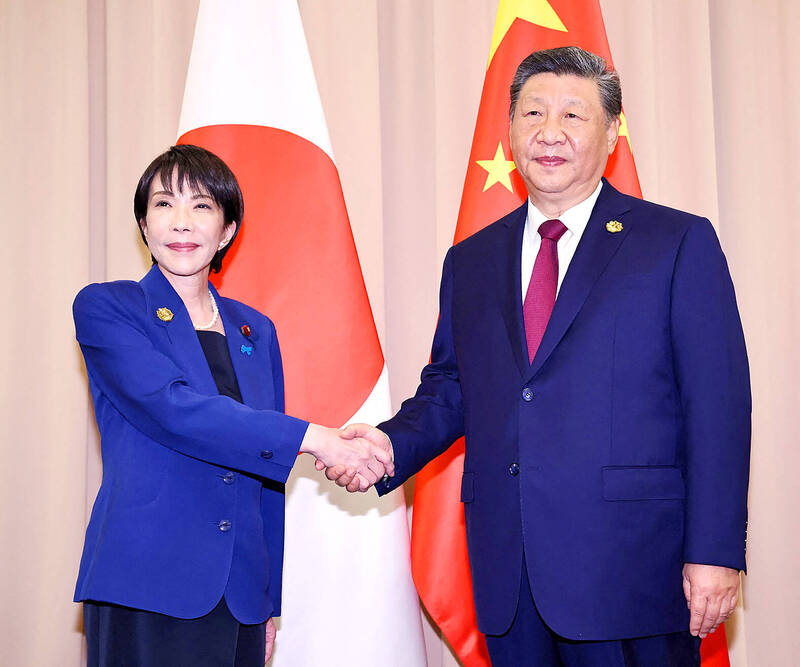Politics
Takaichi Addresses South China Sea and Human Rights with Xi

Japanese Prime Minister Sanae Takaichi raised significant concerns regarding the South China Sea, Hong Kong, and Xinjiang during her first meeting with Chinese President Xi Jinping at the APEC Summit in Gyeongju, South Korea. Takaichi, known for her hawkish stance on China, emphasized the importance of a “strategic and mutually beneficial relationship” between Japan and China while addressing these sensitive issues.
Takaichi expressed serious concerns about actions in the South China Sea, where tensions have escalated due to competing territorial claims. She stated, “We expressed serious concerns regarding actions in the South China Sea, as well as the situations in Hong Kong and the Xinjiang Uighur Autonomous Region.” These remarks come amid ongoing international scrutiny over China’s policies in these regions.
Amidst these discussions, Beijing has consistently denied allegations of human rights abuses in Xinjiang, asserting that its policies have effectively eradicated extremism and fostered development. Furthermore, China maintains broad claims over the South China Sea, despite a 2016 international ruling that invalidated its assertions.
Takaichi also addressed the contentious issue of the Senkaku Islands, known as Diaoyutais in China, where Japanese and Chinese vessels frequently encounter each other. Additionally, she raised concerns regarding export controls on essential materials, including rare earth elements, which are critical to various industries. She underscored the need for the release of Japanese citizens detained in China and called for assurances regarding the safety of Japanese expatriates in the country.
Her support for Taiwan was also evident in the discussions, as she noted, “Regarding Taiwan, there was some discussion from the Chinese side. I stated that for the stability and security in this region, maintaining good cross-strait relations is important.” Takaichi’s remarks reflect Japan’s ongoing commitment to security cooperation with Taiwan.
In a related development, China and Canada have taken steps to mend their previously strained relations. During the APEC summit, Xi met with Canadian Prime Minister Mark Carney, where both leaders expressed a desire to improve bilateral ties. A Canadian statement described the meeting as a potential turning point in the relationship.
Xi highlighted the importance of collaborative efforts, stating, “We are willing to work together with Canada to take this meeting as an opportunity to promote the return of bilateral relations to a healthy, stable and sustainable track as soon as possible.” This initiative follows a period of tension marked by Canada’s decision to impose a 100 percent tariff on electric vehicles imported from China and a 25 percent tariff on steel and aluminum.
Both leaders directed their officials to expedite the resolution of trade issues, focusing on specific products such as electric vehicles, canola, and seafood. Xi called for the expansion of pragmatic cooperation in various sectors, including the economy, trade, and energy.
As these dialogues unfold, the international community will be closely monitoring the outcomes and implications for regional stability and economic cooperation.
-

 Lifestyle3 months ago
Lifestyle3 months agoHumanism Camp Engages 250 Youths in Summer Fest 2025
-

 Sports3 months ago
Sports3 months agoDe Minaur Triumphs at Washington Open After Thrilling Comeback
-

 Business4 months ago
Business4 months agoKenvue Dismisses CEO Thibaut Mongon as Strategic Review Advances
-

 Sports4 months ago
Sports4 months agoTupou and Daugunu Join First Nations Squad for Lions Clash
-

 Top Stories4 months ago
Top Stories4 months agoColombian Senator Miguel Uribe Shows Signs of Recovery After Attack
-

 World4 months ago
World4 months agoASEAN Gears Up for Historic Joint Meeting of Foreign and Economic Ministers
-

 Business4 months ago
Business4 months agoOil Prices Surge Following New EU Sanctions on Russia
-

 Entertainment3 months ago
Entertainment3 months agoDetaşe-Sabah Violin Ensemble Captivates at Gabala Music Festival
-

 Health3 months ago
Health3 months agoNew Study Challenges Assumptions About Aging and Inflammation
-

 Entertainment3 months ago
Entertainment3 months agoBaku Metro Extends Hours for Justin Timberlake Concert
-

 Business4 months ago
Business4 months agoU.S. House Approves Stablecoin Bill, Sends to Trump for Signature
-

 Top Stories4 months ago
Top Stories4 months agoRethinking Singapore’s F&B Regulations Amid Business Closures









